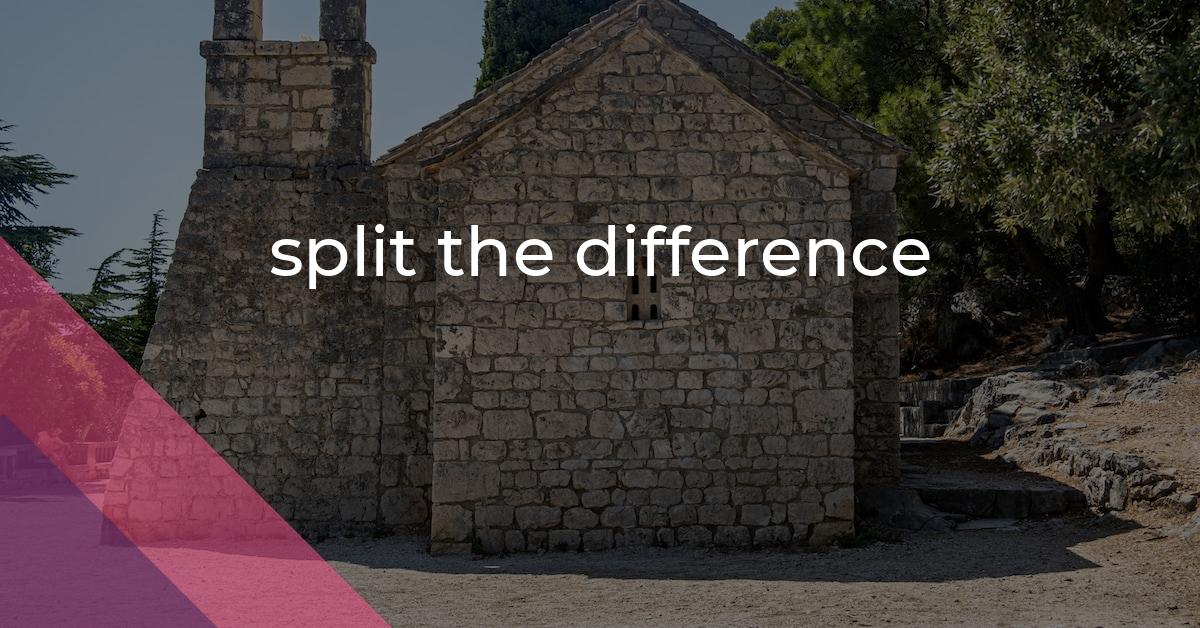split the difference: Idiom Meaning and Origin
What does ‘split the difference’ mean?
The idiom "split the difference" means to reach a compromise or settlement by each party giving up something and finding a middle ground that is halfway between their initial positions.

Idiom Explorer
The idiom "take sides" means to choose or support one person, group, or opinion over another, often in a conflict or disagreement.
The idiom "split up" means to end a relationship or partnership, resulting in two or more separate entities or individuals. It is often used to describe the dissolution of a romantic relationship or the disbandment of a group.
The idiom "six of one, half a dozen of the other" means that two choices or options are essentially the same in outcome or value.
The idiom "settle for" means to accept or choose something that is less desirable or satisfactory than what was originally wanted or expected.
"Play both sides against the middle" means to manipulate or exploit two opposing parties or groups in order to benefit oneself or reach a personal advantage. This idiom suggests a strategic move of pitting two opposing forces against each other while positioning oneself in the middle to leverage the situation for personal gain.
The idiom "parting of the ways" refers to a situation where two or more people or groups are going in different directions or have different opinions, leading to a separation or disagreement.
The idiom "middle of the road" means taking a moderate or neutral stance, avoiding extreme positions or opinions.
The idiom "middle ground" refers to a position or solution that is a compromise between two extreme options or opinions.
The idiom "happy medium" refers to finding a balance or compromise between two extremes or conflicting ideas.
Finding Middle Ground
The idiom "split the difference" is commonly used in American English to refer to a compromise or agreement reached by two parties by each giving up a part of their original demands. This expression is often used in negotiations, where it suggests finding a middle ground between two opposing positions. The phrase can be used in various contexts, such as business deals, personal relationships, or resolving conflicts.
The origin of this idiom dates back to the 16th century, and it is believed to have derived from the older phrase "divide the difference." Sharing or dividing something equally has been a long-standing concept in human culture, evident in historical texts and practices.
Regarding the etymology of the idiom, "split" comes from the Old English word "splittan," meaning to divide or split. On the other hand, "difference" originates from the Latin word "differentia," which means distinction or variation. Combining these two words, the idiom implies dividing the gap or disparity between two positions to reach a compromise.
The idiom "split the difference" is often used in negotiation scenarios, emphasizing the importance of finding a middle ground or compromise. In the art of negotiation, both parties are willing to give up a portion of their demands to reach an agreement. This idiom aligns with the American value of fairness and equality, encouraging a balanced solution that satisfies both sides.
One related idiom is "meet halfway," which shares a similar meaning. It suggests that both parties should make equal efforts and concessions to find a compromise. By meeting halfway, each side demonstrates their willingness to find a common ground and avoid extreme positions.
Another related idiom is "happy medium," which refers to finding a solution or position that avoids extremes and satisfies all parties involved. It implies that a compromise that brings about moderate satisfaction can lead to a positive outcome.
A third related idiom is "middle ground," which also emphasizes finding a compromise between opposing positions. It suggests that there is a neutral territory or a point of agreement that both parties can reach without completely giving up their original demands.
The fourth related idiom is "middle of the road," which means having a moderate or neutral position. It suggests that a compromise can be found by avoiding extreme positions and instead opting for a balanced solution that takes elements from both sides.
While the idiom "split the difference" is widely accepted and used, it does have some limitations. It may not always be the best approach in situations where a more creative or alternative solution is needed. Additionally, "splitting the difference" may not always lead to a fair outcome, as one party may end up making a bigger sacrifice than the other.
The idiom "split the difference" has become a popular expression in American English to convey the idea of finding a compromise through shared concessions. Its origin remains uncertain, but it can be traced back to the concept of dividing or sharing something equally. Although it has its limitations, the idiom continues to be widely used in various contexts, highlighting the importance of reaching a mutual agreement.
Example usage
Examples of how the idiom "split the difference" can be used in a sentence:
- After negotiating the price of the car, they finally agreed to split the difference and settled on a price that was satisfactory for both of them.
- When the group couldn't reach a unanimous decision, they decided to split the difference and go with the compromise option.
- In order to resolve the dispute, the judge suggested that both parties should split the difference and find a middle ground that would be fair for everyone.
More "Negotiation" idioms



